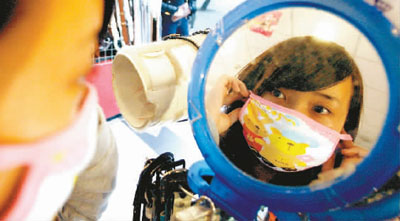| 
While the producer of an "anti- A(H1N1) flu" mask claims to be too busy with a flood of phone calls for orders after a State news agency championed their use, the Ministry of Health 'warned the public that the so-called virus-killing mask has no magic to fight the new flu, and it is no different than a normal mask.
The mask, produced by Mingda Technology in Tianjin, could effectively inhibit 92 percent of the A(H1N1) flu virus, according to a report issued by the National Influenza Center, the Xinhua News Agency reported Sunday.
Using anti-microbial and far-infrared technology, the mask can even promote blood circulation in people's faces and is good for the skin. Even after washing, the mask proves to be still "effective in fighting virus and bacteria," said the report, which was carried in many newspapers across the country.
The masks will be on sale for 58 yuan ($8.50) apiece, according to the company. The price for a normal mask is less than 10 yuan.
"It took five PhD-holding employees in our company half a year to develop the mask," Guo Miaoqing, the general manager of Mingda, told the Global Times Monday. "Customers rushed to order the masks, including those coming from Taiwan and foreign countries."
Guo claimed that she and all of her employees were too busy to fax the test report by the National Influenza Center to the Global Times, as business is booming and everyone was busy answering phones.
Mingda's swift sale coincided with the health authority's warning for caution.
"The containing or killing microorganisms' function claimed by some manufacturers is not particularly effective with the A(H1N1) flu," the Ministry of Health said in a statement on its website Monday.
The ministry said it issued the statement in response to media reports of the "successful development of an anti- A(H1N1) flu mask" in China.
Experts said the flu spreads mostly via human saliva, so a standard medical mask will meet the need for prevention. The ministry added that healthy people are not recommended to wear a mask in normal activities in public places.
Before the health ministry stepped in, the public had already been voicing doubts over the effects of the Mingda mask.
"If this is true, why is the Central Government still encouraging the public to have the vaccination instead of handing out the so-called flu-proof masks?" a Beijing resident surnamed Xie told the Global Times Monday.
Wang Yuedan, who holds a PhD in immunization from Peking University, wrote in his blog that the concept of an A(H1N1)-proof mask is merely a sales strategy.
The crucial thing is whether the mask is up to N95 standards, he wrote, referring to a standard formulated by the American research institute NIOSH for masks.
In the Xinhua story, Mingda claimed that the Institute of Physics and Chemistry at the Chinese Academy of Sciences had tested the material for the mask, and found it can kill "a lot of bacteria harmful for humans," such as E-coli.
An employee at the institute, who declined to give his name, told the Global Times 'that Mingda once sent some underwear to them for testing and the result did prove satisfactory.
"But our test is about killing bacteria; it's different from fighting a virus," the man said.
As for the report on the mask's effective prevention of A(H1N1) issued by the National Influenza Center, a staff member surnamed Zhou said she had no knowledge of the test, adding "we haven't done any tests for the company."
Entering "H1N1 flu" on Chinese website taobao.com, one of China's largest online shopping portals, turns up some 34,125 entries offering anti-A(H1N1) goods, from masks, Chinese traditional medicine and air purifiers to handbooks on fighting the flu virus.
The public should be cautious of businesses taking advantage of the increasingly predominant A(H1N1) flu, a report by the Beijing Times pointed out Monday.
According to a report released by the Ministry of Health Monday, 4,551 more A(H1N1) cases were confirmed on the mainland in the three-day period ending 'afternoon, bringing the total infected to 59,478, of which 44,662 people have recovered. A total of 30 people have died from the flu.
About 9 million people have been inoculated with the flu vaccine nationwide, as more people are ready to get the shot, the report said.
In another development, the health authority of Beijing has announced that not only holders of the city's residence registration, or hukou, can receive the vaccination, but that migrant workers will also be included in the program.
Editor: Guo Changdong Source: Global Times |

